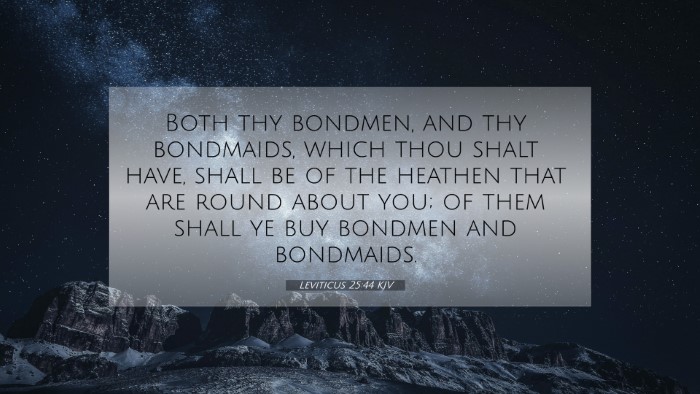Understanding Leviticus 25:44
Leviticus 25:44 states: "And as for your male and female slaves whom you may have, you may buy male and female slaves from among the nations that are around you. " This verse deals directly with the laws governing servitude and slavery in ancient Israel, providing insight into the socio-economic practices of the time.
Summary of Commentary Insights
Commentators like Matthew Henry, Albert Barnes, and Adam Clarke provide deep insights into this verse that reflect on its historical context, societal implications, and theological interpretations.
Historical Context
Matthew Henry's Commentary highlights that this regulation reflects the cultural practices of surrounding nations. In ancient times, slavery was widespread, and this scripture laid out guidelines which aimed to govern such practices among the Israelites to ensure some level of protection and rights for slaves.
Albert Barnes adds that the Israelites treated their servants differently from the surrounding nations. While servitude existed, there was a call for humane treatment, suggesting that this practice had implications for justice and mercy within the community.
Adam Clarke emphasizes that while the laws regarding slavery may seem harsh by contemporary standards, they were progressive for the time, signaling an understanding of human dignity that was not present in other cultures of that era.
Theological Implications
This verse initiates a deeper exploration of servitude that can be tied to a broader theological message about freedom and redemption. This can be linked to:
- Exodus 21:2-6 - Further explores the rights of servants.
- Deuteronomy 15:12-15 - Outlines the release of Hebrew servants in the Jubilee year, emphasizing the theme of liberation.
- 1 Timothy 1:10 - The New Testament perspective on slavery and moral law, advocating for the sanctity of life.
- Galatians 4:7 - The transformation of status from slave to heir through Christ as a metaphor for spiritual redemption.
- Luke 4:18-19 - Jesus' proclamation of freedom and the essence of the Spirit’s work relates back to this theme.
- Matthew 20:25-28 - Jesus' teachings on servanthood being different from authoritative slavery.
- Romans 6:17-18 - Discusses the transition from being enslaved to sin to becoming slaves of righteousness.
Analyzing Cross-References
This verse can be connected to other Scriptural references which collectively enhance the understanding of relationships between servant and master, freedom, and divine law:
- Exodus 21:16 - Addresses man-stealing and its consequences, shedding light on the ethical dimensions of slavery.
- Leviticus 19:18 - Commands love for your neighbor, which can imply ethical treatment of servants.
- Colossians 4:1 - A commandment to masters about fairness towards slaves, reflecting the teachings of Christ.
Connecting Themes
The themes of liberty and servitude intertwine throughout the Bible, as witnessed in connections found in both the Old and New Testaments. The contextual understanding of slavery in Leviticus helps us examine how Biblical narratives address human dignity, justice, and compassion.
Tools for Cross-Referencing
For deeper exploration, consider utilizing tools such as:
- Bible Concordance: A resource that indexes words and their relationships across the scripture.
- Bible Cross-Reference Guide: Helps locate parallels and similar themes across verses.
- Cross-referencing Bible Study: Enable structured studies connecting various themes and texts.
- Comprehensive Bible Cross-Reference Materials: Collections of resources for extensive study.
Conclusion
Leviticus 25:44 serves as a gateway for understanding the complexities of servitude in biblical times. It encourages deeper contemplation on the ways these ancient laws inform current ethical discussions regarding human rights and dignity. Engaging with the cross-referenced themes throughout the Bible enlightens us about the enduring messages of justice and redemption.
Further Study Recommendations
For those interested in exploring further:
- How to find cross-references in the Bible to dig deeper into specific themes.
- Comparative study of Pauline epistles for modern applications of servitude and freedom.






